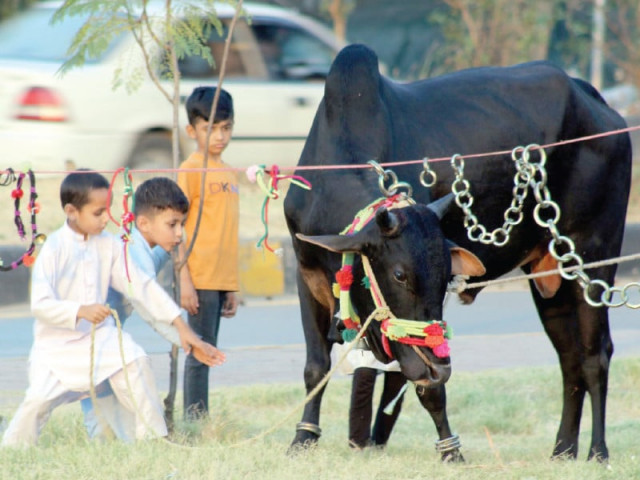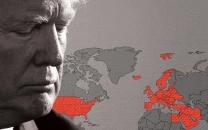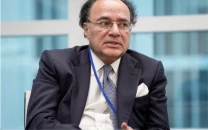Inflation dampens sacrificial animal sales
Loss of purchasing power of citizens caused by record inflation blamed for lacklustre market

The prices of sacrificial animals have dropped in the major cattle markets of Rawalpindi and Islamabad, primarily due to the loss of purchasing power caused by record inflation and high taxes.
This decline in animal sales has resulted in substantial financial losses for the contractors of these markets.
The entry fees for large animals like buffaloes and camels were set at Rs3,000, and for small animals, it was Rs2,000. However, contractors have been forcibly charging Rs4,000 for small animals and Rs6,000 for large animals.
Despite these inflated entry fees, the markets failed to attract buyers, leading to significant losses for the contractors.
The major cattle markets at Bhata Chowk and Rawat in Rawalpindi and the G-11 cattle market in Islamabad did not meet their sales targets. A considerable number of animals remained unsold due to the highest prices ever recorded in the country's history.
Citizens flocked to see the animals but were deterred by the high prices.
The price of bulls ranged from Rs0.5 million to Rs2.5 million, while the price of super bulls ranged from Rs0.8 million to Rs1.2 million. Camels were priced between Rs400,000 and Rs1,000,000, and goats ranged from Rs100,000 to Rs200,000.
Despite a 15 per cent reduction in animal prices on Saturday afternoon, the poor and middle-class citizens were still unable to afford them due to their diminished purchasing power.
Trader Shakir Ullah suggested that abolishing all taxes from cattle markets and ending the extortion by police and administration could lead to a 40 per cent decrease in prices. He proposed that if traders were permitted to sell animals throughout the city during the last three days of Eid, and each trader was allowed to keep three to five animals under the standard operating procedures (SOPs) on all roads in the city, prices would become more affordable.
Citizen Abdul Basit expressed that the significant increase in prices has excluded the poor from participating in this tradition. Even government employees in scales 1 to 15 and low-wage private-sector employees are unable to afford these expensive animals.
Basit suggested that if the government’s Livestock Department sold small and large animals for sacrifice, it could help reduce prices. He lamented that while sacrifice is a religious obligation, it has now become one of the most expensive forms of worship.
The ongoing economic challenges have significantly impacted the purchasing power of citizens, leading to a subdued atmosphere in the cattle markets of Rawalpindi and Islamabad.
The unsold animals and financial losses of market contractors underscore the broader economic struggles faced by the population.
With the final day of the cattle markets approaching, it remains uncertain whether last-minute buyers will be able to make purchases or if the high prices will continue to deter them. The traders and citizens alike hope for a more accessible and affordable market in the future, where everyone can participate in the tradition of sacrifice without financial strain.



















COMMENTS
Comments are moderated and generally will be posted if they are on-topic and not abusive.
For more information, please see our Comments FAQ